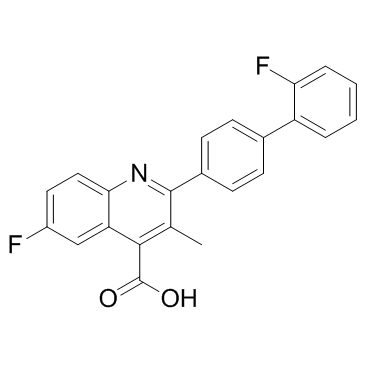
Brequinar
CAS No. 96187-53-0
Brequinar( NSC 368390 | DUP785 | Bipenquinate )
Catalog No. M19842 CAS No. 96187-53-0
Brequinar is a potent inhibitor of dihydroorotate dehydrogenase with potent activities against a broad spectrum of viruses.
Purity : >98% (HPLC)
 COA
COA
 Datasheet
Datasheet
 HNMR
HNMR
 HPLC
HPLC
 MSDS
MSDS
 Handing Instructions
Handing Instructions
| Size | Price / USD | Stock | Quantity |
| 2MG | 37 | In Stock |


|
| 5MG | 60 | In Stock |


|
| 10MG | 87 | In Stock |


|
| 25MG | 161 | In Stock |


|
| 50MG | 239 | In Stock |


|
| 100MG | 356 | In Stock |


|
| 200MG | Get Quote | In Stock |


|
| 500MG | Get Quote | In Stock |


|
| 1G | Get Quote | In Stock |


|
Biological Information
-
Product NameBrequinar
-
NoteResearch use only, not for human use.
-
Brief DescriptionBrequinar is a potent inhibitor of dihydroorotate dehydrogenase with potent activities against a broad spectrum of viruses.
-
DescriptionBrequinar is a potent inhibitor of dihydroorotate dehydrogenase with potent activities against a broad spectrum of viruses.(In Vitro):Brequinar reduces virus progeny production by >90%, with EC50 of 17 nM. Brequinar (5 μM) also inhibits other orthopoxviruses, and blocks virus DNA replication. Brequinar does not affect virus early gene expression, but has a severe effect on the late stage of the virus cycle. Brequinar reduces the level of envelope protein production and the viral titer in a dose-dependent manner, with EC50 of 78 nM in the CFI assay. Brequinar (5 μM) inhibits viral RNA synthesis. Brequinar has antiviral effect, but the effect is reversed by pyrimidine. Brequinar-resistant viruses can be selected in cell culture. Brequinar (5 μM) suppresses the luciferase activities from both the WT and NS5 mutant replicons. Brequinar sodium effectively prevents the increase in PyNTP levels with an IC50 of 0.26 μM. Brequinar sodium effectively inhibits cell proliferation with an IC50 of 0.26 μM. Brequinar sodium inhibits autophosphorylation of p56lck with IC50 of 70 μM; inhibition is 39, 41, and 60% for 25, 50, and 100 μM Brequinar sodium, respectively. Brequinar sodium also inhibits the phosphorylation by p56lck of the exogenous substrate, histone 2B, with an IC50 of 70 μM; inhibition is 10, 43, 59, and 86% for 25, 50, 100, and 200 μM Brequinar sodium, respectively. Brequinar sodium inhibits autophosphorylation of p59fyn with an IC50 of 105 μM; inhibition is 0, 17, 48, and 65% for 25, 50, 100, and 200 μM Brequinar sodium, respectively. Brequinar sodium also inhibits the phosphorylation by p59fyn of histone 2B with an IC50 of 20 μM; inhibition is 26, 54, 79, 83, and 84% for 10, 25, 50, 100, and 200 μM Brequinar sodium, respectively.(In Vivo):Brequinar sodium-treated (10-20 mg/kg/day) mice has a 31% reduction in percentage of packed cell volume compared with untreated BALB/c mice. Brequinar sodium reduces UTP and CTP levels in bone marrow cells by 30 and 25%, respectively. Brequinar sodium (10-20 mg/kg/day) in combination with uridine (1000-2000 mg/kg/day) prevents anemia, and the hematocrits remain at levels (61-63%) comparable with those of untreated controls.
-
In VitroBrequinar reduces virus progeny production by >90%, with EC50 of 17 nM. Brequinar (5?μM) also inhibits other orthopoxviruses, and blocks virus DNA replication. Brequinar does not affect virus early gene expression, but has a severe effect on the late stage of the virus cycle. Brequinar reduces the level of envelope protein production and the viral titer in a dose-dependent manner, with EC50 of 78 nM in the CFI assay. Brequinar (5 μM) inhibits viral RNA synthesis. Brequinar has antiviral effect, but the effect is reversed by pyrimidine. Brequinar-resistant viruses can be selected in cell culture. Brequinar (5 μM) suppresses the luciferase activities from both the WT and NS5 mutant replicons. Brequinar sodium effectively prevents the increase in PyNTP levels with an IC50 of 0.26 μM. Brequinar sodium effectively inhibits cell proliferation with an IC50 of 0.26 μM. Brequinar sodium inhibits autophosphorylation of p56lck with IC50 of 70 μM; inhibition is 39, 41, and 60% for 25, 50, and 100 μM Brequinar sodium, respectively. Brequinar sodium also inhibits the phosphorylation by p56lck of the exogenous substrate, histone 2B, with an IC50 of 70 μM; inhibition is 10, 43, 59, and 86% for 25, 50, 100, and 200 μM Brequinar sodium, respectively. Brequinar sodium inhibits autophosphorylation of p59fyn with an IC50 of 105 μM; inhibition is 0, 17, 48, and 65% for 25, 50, 100, and 200 μM Brequinar sodium, respectively. Brequinar sodium also inhibits the phosphorylation by p59fyn of histone 2B with an IC50 of 20 μM; inhibition is 26, 54, 79, 83, and 84% for 10, 25, 50, 100, and 200 μM Brequinar sodium, respectively.
-
In VivoBrequinar sodium-treated (10-20 mg/kg/day) mice has a 31% reduction in percentage of packed cell volume compared with untreated BALB/c mice. Brequinar sodium reduces UTP and CTP levels in bone marrow cells by 30 and 25%, respectively. Brequinar sodium (10-20 mg/kg/day) in combination with uridine (1000-2000 mg/kg/day) prevents anemia, and the hematocrits remain at levels (61-63%) comparable with those of untreated controls.
-
SynonymsNSC 368390 | DUP785 | Bipenquinate
-
PathwayOthers
-
TargetOther Targets
-
RecptorOthers
-
Research AreaCancer
-
IndicationAcute myeloid leukaemia
Chemical Information
-
CAS Number96187-53-0
-
Formula Weight375.37
-
Molecular FormulaC22H13F2NO2
-
Purity>98% (HPLC)
-
SolubilityDMSO:≥ 62.5 mg/mL (166.50 mM)
-
SMILESCc1c(nc2ccc(F)cc2c1C(O)=O)-c1ccc(cc1)-c1ccccc1F
-
Chemical Name——
Shipping & Storage Information
-
Storage(-20℃)
-
ShippingWith Ice Pack
-
Stability≥ 2 years
Reference
1.Qing M et al. Characterization of dengue virus resistance to brequinar in cell culture. Antimicrob Agents Chemother. 2010 Sep;54(9):3686-95.
molnova catalog



related products
-
Tolfenpyrad
Tolfenpyrad is an effective insecticide[1], used against pests that are resistant to existing insecticides such as organophosphates and carbamates.
-
Atecegatran TFA
Atecegatran TFA is often used as an anticoagulant and can be used to treat cardiovascular disease.
-
Hsp Heat shock prote...
Hsp Heat shock protein (3-13)



 Cart
Cart
 sales@molnova.com
sales@molnova.com


